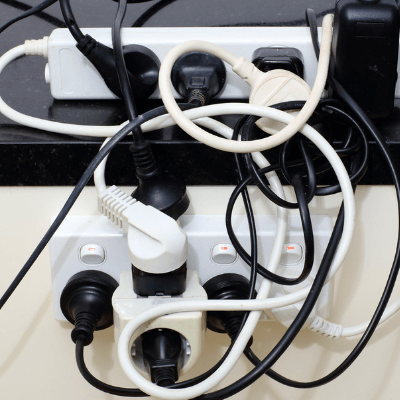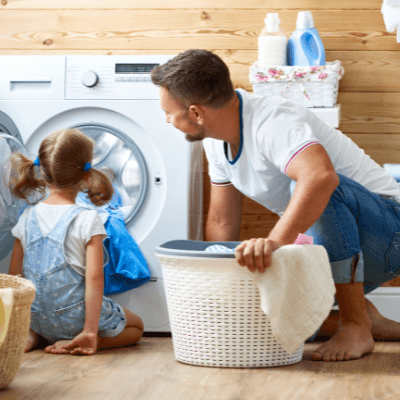Ultimate room-by-room home fire safety guide
- Almost 20,000 fires occur in residential properties every year in Australia
- Every room presents its own risks, many of which we take for granted
- By taking small proactive steps, you can minimise fire risk in your home
A fire ripping through the place you call home certainly falls into the ‘worst nightmare’ category – and each year in Australia, thousands of people see that nightmare become reality.
In a 12-month period, more than 19,000 fires affect structures in Australia1, and while property and possessions can usually be replaced, sentimental items and most importantly, lives can’t. On average, more than 60 people2 nationally lose their lives as a result of residential fires.
The vast majority of house fires, however, can be prevented or minimised by taking steps before an incident occurs. By being aware of fire risks in the home, you can keep your property as fire-safe as possible, and dramatically reduce the chances of a home fire.
Different rooms in the home present different risks, and we’re going to start off in the place that almost half of all residential fires begin: the kitchen3.
Fire safety in the kitchen: avoiding foodie foibles
It’s the heartbeat of many homes, but in the kitchen a number of fire risks sit in plain sight. When cooking:

- Always choose the right size saucepan for whatever you’re cooking to help avoid fat splatters which can cause burns and fires.
- As tempting as it is (and almost three out of four of us do it), never leave cooking unattended – it only takes a moment for something to happen.
- Always turn the handles of pots and pans inward to help prevent them from being knocked over.
- Don’t wear loose-fitting sleeves when cooking or leave tea towels or oven mitts near the cooktop – they can all easily catch fire.
- Clean the grill after every use and the rangehood regularly – a build-up of grease can ignite (if you currently do this, you’re in the minority).
- Only ever use microwave-safe utensils and containers – anything metallic will spark and can cause a fire.
- A lot of recycled paper towels contain very small metal flecks, so only use recycled paper towels that specifically state they’re safe for microwave use.
- If you have a microwave fire, turn it off and unplug if possible, and keep the door closed until the fire suffocates4.
Fire safety tip: kitchen oil fires: Never try to put out a fire or oil fire with water – water can cause the fire to spread rapidly. If a pan containing oil catches fire, don’t carry it through the house – it may cause the fire to spread and cause injury. Instead, cover the fire with a lid, wooden chopping board and use a fire blanket and extinguisher.
Kitchen appliance fire risks
- Never run the dishwasher if you’re leaving the house or going to bed – old or faulty heating elements can cause a fire. Only use the dishwasher if you’re present.
- An overheated compressor in a fridge can cause fires if they can’t vent correctly. Newer and higher-spec fridges should have a metal backing that acts as a heat shield, however older and lower-spec fridges may not5. While a fridge fire is rare, the impact can be devastating – this is what reportedly started the Grenfell Tower fire in London6. Switch off your refrigerator immediately if you suspect there is a problem and call in a professional to check it out. It’s also wise to avoid storage of any explosives, flammables, and chemicals inside or near the fridge.
- Many of us use a toaster in the morning – but left unattended they can be the spark that sets the kitchen ablaze. Regularly remove crumbs from the bottom of the toaster to minimise the risk.
Fire safety tip: Keep a fire extinguisher and fire blanket in the kitchen, located between the oven and an exit door.
Fire safety in the bedroom: avoid bad bedroom habits to keep the right sparks flying
We all want a solid, comfortable night’s sleep, so make sure you reduce the risk of an unwanted interruption.
- Wheat bags can dry out with age and become combustible, so only ever use them for their intended purpose (they weren’t designed to replace hot-water bottles!). QBE research revealed that more than 44 per cent of people use wheat bags in bed or in the bedroom, and, in doing so, are unwittingly putting themselves at risk7. Never let anyone sleep with a wheat bag, and don’t reheat it before it’s completely cooled.

- Don’t charge a device in or by your bed. More than 60 per cent of Australians (and 83 per cent of those aged 21 to 34) are guilty of it, but poor ventilation can result in your bed going up in flames.
- Electric blankets can cause a fire if used incorrectly. Most fires occur in old blankets that are worn or blankets that are misused (for example, used when wet or folded8). Fires have started when electric blankets have been left on at night or during the day, so make sure you turn them off.
- Candles in the bedroom can be a great mood-enhancer, but make sure they’re extinguished before you nod off. In South Australia alone, candle fires over the past five years have been responsible for fires in 113 homes, causing $8m of damage9.
- Don’t smoke in bed. Between 2003 and 2017 in Australia, more than 50 people lost their lives after a fire started as a result of them lighting up between the sheets10.
Fire safety tip: When heating a wheat bag, add a cup of water into the microwave with it to slow the drying-out process.
Living rooms and office: no place for piggybacks
The home’s a busy place – particularly when we’re working from home. Take a moment to assess the everyday risks that are right under your nose.

- With multiple devices and an increase in working from home, we’re often left in situations where there are too many plugs and not enough sockets. While power boards can offer additional capacity, it’s important not to plug additional adaptors into them (known as ‘piggybacking’), as it can cause an overload, resulting in a fire risk. Fire services recommend only using power boards with built-in safety switches11.
- QBE research suggests 44 per cent of us leave our laptops and phones plugged in when we leave the house, and almost 50 per cent leave our computers plugged in12! This can be unwise; laptops usually have vents on the bottom or side, and if the laptop is left on a soft surface, it can block those vents and subsequently overheat13.
- During winter, a roaring fire is a wonderful thing, but it needs careful management. Always have your chimney cleaned at least once a year to reduce the risk of chimney fires14, always use a fire screen, and make sure any wood is kept at least a metre away from the fireplace15.
- During the cooler months in particular, drying clothes can be a challenge. However, putting clothes too close to heaters can cause your favourite jumper to go up in smoke. Never place clothes or towels directly on a heater – keep them at least one metre away from heaters or fireplaces16.
- Portable heaters need to be checked regularly to ensure they’re safe to use. Watch out for rusted reflectors and damaged power cords on electric heaters, and keep an eye on lighting difficulties or yellow flames on gas heaters. It’s advised to get these appliances serviced by a qualified electrician or gas fitter17. Make sure your heater is in a safe place, away from material such as curtains, and can’t be knocked over, especially by children or pets.
Fire safety tip: If you’re wearing clothes that catch fire, don’t run – that just makes the fire burn hotter and faster. Stop, drop to the ground and cover your face with your hands, then roll over and over to extinguish the fire17.
The bathroom and laundry: the little-known fire hotspot

They may not seem like prime fire-starting rooms, but the bathroom and laundry hold their own risks.
- One of the major bathroom fire risks comes in the form of something you may not expect: the exhaust fan. Several models have caused fires in the past in Australia18, and it’s wise to clean the fan regularly to avoid lint collecting, overheating and potentially causing sparks to fly.
- Canisters – for example, those containing deodorant or hairspray – should be kept out of direct sunlight19, as should mirrors20.
- Hairdryers, tongs and straighteners can all cause fires. They get extremely hot, so remember to turn them off and let them cool on a heatproof surface.
- In the laundry, dryers are a particular risk. According to research from QBE12, 28 per cent of us frequently or occasionally leave our tumble dryer going when we leave the house. This can be a fire risk, given that 61 per cent of us don’t clean our lint filters regularly. The lint produced can become a fire hazard, as it can cause overheating.
Fire safety tip: Get into the habit of cleaning the lint from your tumble dryer after every use. And if you’re laundry is outside make sure you’ve got a fire alarm installed.
The great outdoors: vigilance required
- Barbeques are a key part of Australian life, however they need to be fired up responsibly. Always check hoses and connections for blockages and wear and tear, and always cook on a flat base sheltered from gusts of wind, away from anything flammable21. Keep the barbeque clean, too.
- Store flammable materials – such as petrol, kerosene and methylated spirits – away from heat sources.
- Maintenance is crucial around the exterior of the home. While leaves and debris in gutters, and trees close to the property, won’t necessarily start a fire, if one starts, they’ll ensure it spreads quickly. Clean gutters regularly, and keep trees trimmed back and leaves swept up.
- If you have a fire pit, ensure it’s a safe distance (2.5m22) away from vegetation, a structure or combustible materials, and ensure it’s placed on a solid surface. Never leave it unattended, and always extinguish with water when you’ve finished with it23.
Fire safety tip: Always have a water supply in easy reach of the barbeque. And don’t store chemicals or flammable materials nearby.
Bushfire Attack Level: do you know yours?
Bushfires pose a significant risk to homes in many areas of Australia, so it’s important to understand if you are in a bushfire attack zone and be aware of your home’s Bushfire Attack Level (BAL), especially if you have an older home.
- Older homes (40 – 60 plus years old) are more vulnerable to fire because they haven’t been built in line with modern more stringent building requirements. If you’re in an attack zone, upgrading your home in line with newer building requirements, with the help of a qualified builder or fire safety professional, could lower your home’s risk.
- If your home is in a bushfire zone, make sure your sum insured includes the cost of bushfire protection measures, which you’d need to implement when rebuilding your home. The requirements, and costs, will vary depending on your home’s BAL.
Fire safety tip: Contact your local council, or visit their website, for advice on your BAL.
The proactive approach to home fire prevention
By being aware of the risks that are around us everyday, we can make our homes safer for everyone. Overall, remember to:
- Test your smoke alarms regularly to ensure they’re in working order. Regulations differ from state to state, however if your smoke alarm is battery-powered, an easy way to remember is to change the batteries when the clocks change.
- Invest in fire extinguishers and blankets and place them between a fire hazard and an exit.
- Create a fire escape plan to ensure everyone in the home knows what to do if the worst happens.
- If you plug it in, check it out. A significant number of house fires (40 per cent in NSW, for example) are caused by electrical faults and appliances24. Get your wiring checked by a professional, particularly if you notice signs such as flickering lights, the power tripping, or any charring around power points25.
- Understand your level of bushfire risk and consider more modern safety upgrades if you have a older home in a high risk zone.
Despite taking preventative measures, you can never completely eliminate the risk of a fire in your home. But the correct levels of home and contents insurance can provide protection before, to help get you back on your feet after, if the worst happens.
1 https://www.aph.gov.au/Parliamentary_Business/Committees/Senate/Legal_and_Constitutional_Affairs/Fire_safety/Report/c02
2 Preventable_residential_fire_fatalities_july_2003_to_june_2017_bushfire_and_natural_hazards_crc.pdf
3 https://www.fire.nsw.gov.au/page.php?id=83
4 https://www.fire.nsw.gov.au/page.php?id=296
5 https://www.realtor.com/news/trends/exploding-refrigerator-hidden-home-danger/
6 https://www.standard.co.uk/news/london/tiny-overheated-wiring-in-fridge-freezer-sparked-grenfell-tower-inferno-expert-tells-inquiry-a4001731.html
7 Polling study of 1,011 Australians, aged 18-65, completed for QBE Insurance Australia in April 2021
8 https://www.mfs.sa.gov.au/community/safety-and-education/fact-sheets-and-brochures/fact-sheet-pages/electric-blankets
9 https://www.mfs.sa.gov.au/__data/assets/pdf_file/0007/472849/2021-06-01-MFS-Candle-fire-warning-as-Home-Fire-Safety-Week-launched.pdf
10 https://www.tobaccoinaustralia.org.au/chapter-3-health-effects/3-19-smoking-and-accidents
11 https://www.fire.nsw.gov.au/page.php?id=630
12 Polling study of 1,011 Australians, aged 18-65, completed for QBE Insurance Australia in April 2021
13 https://smallbusiness.chron.com/cant-leave-laptop-plugged-sitting-bed-carpet-74482.html
14 https://www.epa.nsw.gov.au/-/media/epa/corporate-site/resources/woodsmoke/resourcekit/epa_woodsmoke_dl_flyer_web.pdf?la=en&hash=5A2382130BB31DE0A200728D1C7D27A32B5CDEDC
15 https://www.fire.nsw.gov.au/page.php?id=9284
16 https://www.healthdirect.gov.au/winter-health-hazards-at-home
17 https://www.healthdirect.gov.au/winter-health-hazards-at-home
18 https://www.smh.com.au/national/bathroom-heaters-a-fire-hazard-recall-20090817-enh7.html
19 https://www.aerosol.com.au/about-aerosols/safety-home
20 https://www.sciencefocus.com/planet-earth/can-sunlight-through-glass-objects-really-cause-house-fires/
21 https://www.fire.nsw.gov.au/page.php?id=323
22 https://www.brisbane.qld.gov.au/clean-and-green/natural-environment-and-water/air-quality/brazier-and-fire-pit-use
23 https://www.brisbane.qld.gov.au/clean-and-green/natural-environment-and-water/air-quality/brazier-and-fire-pit-use
24 https://www.nsw.gov.au/housing-and-construction/safety-home/electrical-safety/electrical-safety-home
25 https://electricalconnection.org/news/6-warning-signs-of-faulty-electrical-wiring-in-your-home-103









